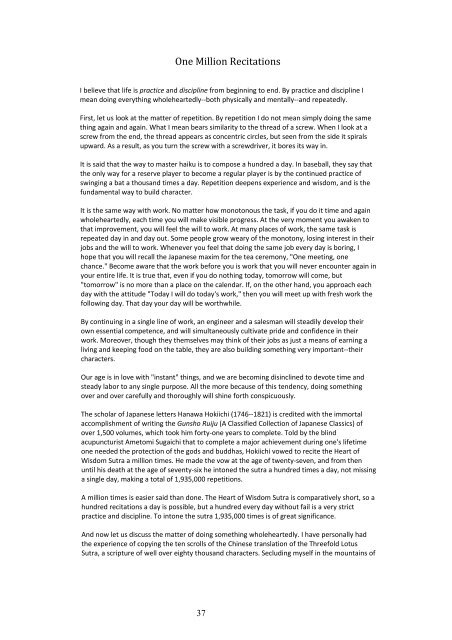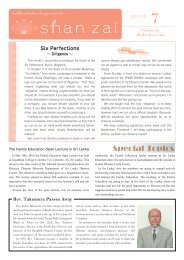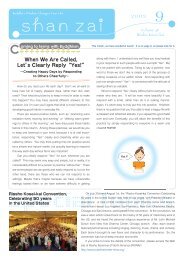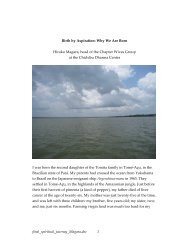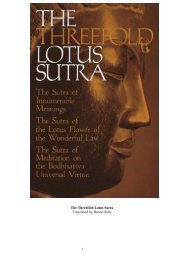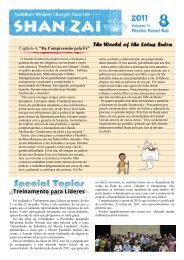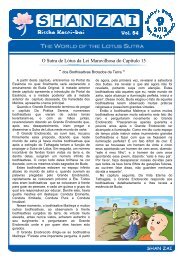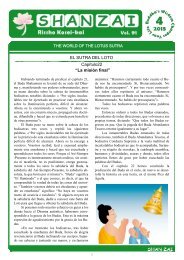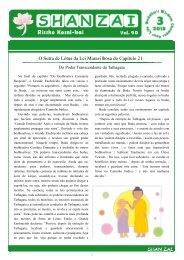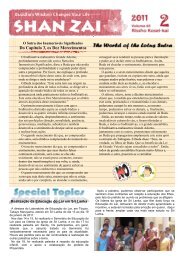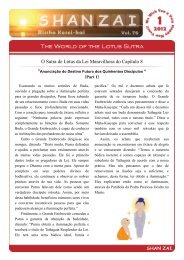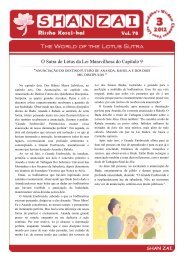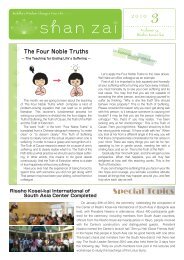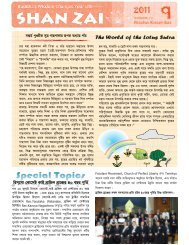work.In ano<strong>the</strong>r section, "The Daily Business of Artisans," Shosan writes:A craftsman said <strong>to</strong> me, "I know it is important <strong>to</strong> seek <strong>the</strong> Buddha's wisdom, but I am <strong>to</strong>o busyat my hereditary occupation <strong>to</strong> do that. How can I ever hope <strong>to</strong> achieve buddhahood?"I replied, "All work is <strong>the</strong> Buddha's work. It is enough if you find buddhahood in <strong>the</strong> pursuit ofyour occupation. You must realize that whatever work you do is work that you are doing for <strong>the</strong>sake of o<strong>the</strong>rs. . . . The Eternal Buddha divides himself in<strong>to</strong> ten billion parts in order <strong>to</strong> benefit<strong>the</strong> world."This is a truly wise perspective. You are one of those parts, and your work is <strong>the</strong> work of <strong>the</strong>Buddha. You do it <strong>to</strong> benefit <strong>the</strong> whole world. All work, of whatever nature, is <strong>the</strong> Buddha'swork, and you can find buddhahood through <strong>the</strong> diligent pursuit of your occupation. All whothrow <strong>the</strong>mselves in<strong>to</strong> <strong>the</strong>ir work with a desire <strong>to</strong> be of service <strong>to</strong> o<strong>the</strong>rs will surely resemble<strong>the</strong> Buddha. Moreover, with <strong>the</strong> conviction in your heart that you are part of <strong>the</strong> Buddha and<strong>the</strong>refore doing <strong>the</strong> Buddha's work, you will naturally come <strong>to</strong> concentrate on it.I believe it was Chekhov who said, "A human being must work. He must work by <strong>the</strong> sweat ofhis brow. Therein lies <strong>the</strong> significance, <strong>the</strong> purpose, <strong>the</strong> happiness, <strong>the</strong> joy, and <strong>the</strong> deepemotion of human life." As <strong>the</strong> amount of leisure time in developed countries grows, <strong>the</strong>number of working hours is decreasing. That is all <strong>the</strong> more reason why this degree ofconcentration on <strong>the</strong> job is important. If one simply tries <strong>to</strong> get through one's quota, one isbound <strong>to</strong> end up producing <strong>the</strong> equivalent of a "Monday car." Someone who falls in<strong>to</strong> <strong>the</strong> habi<strong>to</strong>f working that way will pass <strong>the</strong> weekend unenthusiastically as well, whe<strong>the</strong>r playing sports orreading. If one only halfheartedly works and plays, <strong>the</strong>n one's entire life will be filled withindifference.The potter Kanjiro Kawai (1890‐‐1966) once said, "Work is <strong>the</strong> work of doing work." We are apt<strong>to</strong> feel proud of <strong>the</strong> amount of work we accomplish. Priding ourselves on our ownaccomplishments is important, but good work is <strong>the</strong> kind that does itself. People find it veryhard <strong>to</strong> accomplish anything truly exceptional by <strong>the</strong>mselves. At work we encounter people wedo not get along with. We suffer and endure. We exert our utmost strength. With an invisiblestrength pushing us onward, we complete one job after ano<strong>the</strong>r. Ra<strong>the</strong>r than boasting, "I didit," we should say, "The work is getting done all by itself; I'm just an assistant." When you reallyput yourself in<strong>to</strong> your work, you develop this sort of modesty.One more thing we must remember is that in raising children, <strong>the</strong> most important thing isencouraging <strong>the</strong>ir enthusiasm. Children tend <strong>to</strong> become absorbed in things more easily thanadults. To interrupt that enthusiasm because it is inconvenient for adults is like losing anextremely valuable jewel. For example, when <strong>the</strong> French en<strong>to</strong>mologist Jean Henri Fabre (1823‐‐1915) was engrossed in observing insects as a child, if his parents had said, "What are youdoing? Get right back <strong>to</strong> your studies," <strong>the</strong>n he might not have become <strong>the</strong> author of <strong>the</strong>landmark Souvenirs en<strong>to</strong>mologiques. When children become deeply involved in something,<strong>the</strong>y should be left alone, because <strong>the</strong>re is no telling how that enthusiasm will eventuallygerminate. Perhaps even more important than some future concrete accomplishment is <strong>the</strong>development of <strong>the</strong> habit of <strong>to</strong>tal concentration. It will become <strong>the</strong> child's mainstay throughoutlife.Devote yourself <strong>to</strong> one thing at a time, and you will feel fulfilled, find true meaning in life, andachieve something great.36
One Million RecitationsI believe that life is practice and discipline from beginning <strong>to</strong> end. By practice and discipline Imean doing everything wholeheartedly‐‐both physically and mentally‐‐and repeatedly.First, let us look at <strong>the</strong> matter of repetition. By repetition I do not mean simply doing <strong>the</strong> samething again and again. What I mean bears similarity <strong>to</strong> <strong>the</strong> thread of a screw. When I look at ascrew from <strong>the</strong> end, <strong>the</strong> thread appears as concentric circles, but seen from <strong>the</strong> side it spiralsupward. As a result, as you turn <strong>the</strong> screw with a screwdriver, it bores its way in.It is said that <strong>the</strong> way <strong>to</strong> master haiku is <strong>to</strong> compose a hundred a day. In baseball, <strong>the</strong>y say that<strong>the</strong> only way for a reserve player <strong>to</strong> become a regular player is by <strong>the</strong> continued practice ofswinging a bat a thousand times a day. Repetition deepens experience and wisdom, and is <strong>the</strong>fundamental way <strong>to</strong> build character.It is <strong>the</strong> same way with work. No matter how mono<strong>to</strong>nous <strong>the</strong> task, if you do it time and againwholeheartedly, each time you will make visible progress. At <strong>the</strong> very moment you awaken <strong>to</strong>that improvement, you will feel <strong>the</strong> will <strong>to</strong> work. At many places of work, <strong>the</strong> same task isrepeated day in and day out. Some people grow weary of <strong>the</strong> mono<strong>to</strong>ny, losing interest in <strong>the</strong>irjobs and <strong>the</strong> will <strong>to</strong> work. Whenever you feel that doing <strong>the</strong> same job every day is boring, Ihope that you will recall <strong>the</strong> Japanese maxim for <strong>the</strong> tea ceremony, "One meeting, onechance." Become aware that <strong>the</strong> work before you is work that you will never encounter again inyour entire life. It is true that, even if you do nothing <strong>to</strong>day, <strong>to</strong>morrow will come, but"<strong>to</strong>morrow" is no more than a place on <strong>the</strong> calendar. If, on <strong>the</strong> o<strong>the</strong>r hand, you approach eachday with <strong>the</strong> attitude "Today I will do <strong>to</strong>day's work," <strong>the</strong>n you will meet up with fresh work <strong>the</strong>following day. That day your day will be worthwhile.By continuing in a single line of work, an engineer and a salesman will steadily develop <strong>the</strong>irown essential competence, and will simultaneously cultivate pride and confidence in <strong>the</strong>irwork. Moreover, though <strong>the</strong>y <strong>the</strong>mselves may think of <strong>the</strong>ir jobs as just a means of earning aliving and keeping food on <strong>the</strong> table, <strong>the</strong>y are also building something very important‐‐<strong>the</strong>ircharacters.Our age is in love with "instant" things, and we are becoming disinclined <strong>to</strong> devote time andsteady labor <strong>to</strong> any single purpose. All <strong>the</strong> more because of this tendency, doing somethingover and over carefully and thoroughly will shine forth conspicuously.The scholar of Japanese letters Hanawa Hokiichi (1746‐‐1821) is credited with <strong>the</strong> immortalaccomplishment of writing <strong>the</strong> Gunsho Ruiju (A Classified Collection of Japanese Classics) ofover 1,500 volumes, which <strong>to</strong>ok him forty‐one years <strong>to</strong> complete. Told by <strong>the</strong> blindacupuncturist Ame<strong>to</strong>mi Sugaichi that <strong>to</strong> complete a major achievement during one's lifetimeone needed <strong>the</strong> protection of <strong>the</strong> gods and buddhas, Hokiichi vowed <strong>to</strong> recite <strong>the</strong> Heart ofWisdom Sutra a million times. He made <strong>the</strong> vow at <strong>the</strong> age of twenty‐seven, and from <strong>the</strong>nuntil his death at <strong>the</strong> age of seventy‐six he in<strong>to</strong>ned <strong>the</strong> sutra a hundred times a day, not missinga single day, making a <strong>to</strong>tal of 1,935,000 repetitions.A million times is easier said than done. The Heart of Wisdom Sutra is comparatively short, so ahundred recitations a day is possible, but a hundred every day without fail is a very strictpractice and discipline. To in<strong>to</strong>ne <strong>the</strong> sutra 1,935,000 times is of great significance.And now let us discuss <strong>the</strong> matter of doing something wholeheartedly. I have personally had<strong>the</strong> experience of copying <strong>the</strong> ten scrolls of <strong>the</strong> Chinese translation of <strong>the</strong> Threefold LotusSutra, a scripture of well over eighty thousand characters. Secluding myself in <strong>the</strong> mountains of37
- Page 1 and 2: Invisible EyelashesSeeing What is C
- Page 3 and 4: THE TWO FUNCTIONS OF A CELL 55The P
- Page 5 and 6: For this to take place, it is vital
- Page 7 and 8: Pleasure is filling the empty rice
- Page 9 and 10: Rose or Thorns?The rose is beautifu
- Page 11 and 12: The Contents of Hotei's SackThe mor
- Page 13 and 14: GratitudeFor the past two decades I
- Page 15 and 16: Looking Into the DepthsEach of us m
- Page 17 and 18: Self‐AwarenessSometimes we allow
- Page 20 and 21: the mountains, Po Chu‐i went to m
- Page 22 and 23: and hesitating to take a first step
- Page 24 and 25: "Nothing has an ego" means that all
- Page 26 and 27: self‐love, endeavoring to develop
- Page 28 and 29: ampant, Dr. Schweitzer devoted his
- Page 30 and 31: Everyone has some ability that is b
- Page 32 and 33: een pondering Kepler's theories of
- Page 34 and 35: improved, I would return home only
- Page 38 and 39: Hakone, I finished in fifty‐five
- Page 40 and 41: Many people want to work in their o
- Page 42 and 43: eplied, "One hundred divided by two
- Page 44 and 45: at the gate, the Buddha appeared an
- Page 46 and 47: once again sinks into despair, it t
- Page 48 and 49: individuality grows beyond the boun
- Page 50 and 51: this truth, one becomes keenly awar
- Page 52 and 53: suddenly turned irritable and said,
- Page 54 and 55: well in a sport, one obeys the rule
- Page 56 and 57: There is, however, one infallible r
- Page 58 and 59: The offering of kind words means sp
- Page 60 and 61: We must never think of ourselves an
- Page 62 and 63: The Wind Blowing from the FutureThe
- Page 64 and 65: Courage That Opens DoorsI have many
- Page 66 and 67: "Even Insects Work and Eat"My paren
- Page 68 and 69: Home Is More Than a HavenIn recent
- Page 70 and 71: Where Affection and Gratitude Begin
- Page 72 and 73: Forever Young at HeartAlmost every


